When Condi Met Gaddafi
コンディがカダフィにあった時
独裁者がライス長官に夢中だったというのは有名な話だが、本人の口からこのような新事実を知るのは大変興味深い。独裁者はいずれにしても末路は悲惨だ・・自業自得ではあるが
Oct 20, 2011 2:26 PM EDT
In an exclusive excerpt from Condoleezza Rice’s new memoir, 'No Higher Honor,' the former secretary of state tells all about her meeting with the recently killed Libyan leader Muammar Gaddafi: his obsession with her, his WMD stockpile—and the infamous ‘tent.’ 前国務長官コンドレーザ・ライスの最近刊回想録「ノー・ハイアー・オーナー」の中で、彼女が先日殺害されたリビアの独裁者カダフィとの会談の様子、彼の彼女への思い入れ、大量破壊兵器、そして評判の悪い例の「テント」などについて全て語っている。
My last few months [in office] did not go quietly or without consequence. They even brought historic moments—none more so than my much anticipated visit to Libya to meet with Colonel Muammar Qaddafi. When the Libyans gave up their weapons of mass destruction in 2003, there was a clear diplomatic quid pro quo: in exchange, we’d help them to return to good standing in the international community. But it would not be easy and not only because of Qaddafi’s long record of brutality.
私の任期の最後の数か月は決して静かでもなく、残務処理に追われていた。 どちらかと言えば歴史的な時期だったが・・・カダフィ大佐との会談のためにリビアを訪問することが中でも一番だった。2003年にリビアが大量破壊兵器を放棄したとき、外交的にはなんらかの見返りが必要だった。我々はリビアに国際社会での立ち位置を付与するのを助けたが、カダフィの長きにわたる残酷な政治歴のせいで、それは困難を極めた。
Libya had arrested five Bulgarian nurses and a Palestinian doctor several years before on trumped-up charges that they had deliberately infected more than four hundred Libyan children with HIV. The medics insisted that they were innocent, but the Libyan courts had sentenced the group to death. The United States repeatedly urged Libya to find a way to release them, and I was grateful for the dedication and leadership of European Commissioner for External Relations Benita Ferrero-Waldner on the issue. Libya’s decision in 2007 to commute the sentences and allow the medics to return home was due in large part to Benita’s resolve.
リビアは5人のブルガリア人看護師とパレスチナの医師を数年前に、彼らがリビアの400人以上の子供たちにHIVを意図的に感染させたというでっち上げの罪で逮捕していた。 彼らは無罪を主張したが、リビア法廷はそのグループに死刑の判決を下した。 米国は繰り返しリビアに対して解放するように訴えた、そして私はこの件に関しては、ECの外交委員長のベニタ・フェレロ・ワルドナーの献身と指導力に深く感謝している。 2007年のリビアによる減刑と彼らの母国への帰還を可能にしたのは、大方がベニタの断固たる努力のたまものである。
We had to make sure, too, that we were sufficiently attentive to the sensitivities and needs of the families of the victims of the colonel’s decades-long reign of terror. I withheld my visit until we could secure a Libyan claims settlement for families whose relatives had been killed in attacks such as the bombing by Libyan agents of Pan Am Flight 103 over Lockerbie, Scotland, in 1988.
My upcoming trip gave me powerful leverage in these negotiations because Qaddafi desperately wanted me to visit Tripoli.
我々が十分に大佐の数十年のわたる恐怖支配の犠牲者の家族の感情や要求に十分に配慮しているか、我々もまた神経を使わねばならなかた。 私は1988年のスコットランドのロッカビーでのパンナム103便のリビアのエージェントによる爆破テロのような攻撃の犠牲者の家族とリビア間の賠償交渉などの問題が解決するまでリビア訪問を控えていた。 私のきたるべきリビア訪問は、この交渉に強力なカードとなった、というのは、一連の交渉の中で、カダフィが私のトリポリ訪問を熱望していたからだ。
There were two reasons for this: one traditional and the other, well, a little disconcerting. Obviously, the first visit by a U.S. secretary of state since 1953 would be a major milestone on the country’s path to inter- national acceptability. But Qaddafi also had a slightly eerie fascination with me personally, asking visitors why his “African princess” wouldn’t visit him.
I decided to ignore the latter and dwell on the former to prepare for the trip. The arrangements were not easy, with all manner of Libyan demands, including that I meet the leader in his tent. Needless to say, I declined the invitation and met him in his formal residence.
それには二つの理由が考えられた:一つは伝統的なもので、もう一つは、そう、ちょっとドギマギすることだった。 明らかに1953年以来途絶えていた、米国国務長官の訪問はリビアが国際社会に受け入れられる道程の大きな一歩を意味していた。 しかし、カダフィは少し気味悪いのだが、私に個人的に執心していた。 彼を訪れる人ごとに、自分の「アフリカン・プリンセス」はなぜ来ないのかと聞いていたそうだ。
私は後半の、私に関する理由は無視することにして、前半の理由で熟考して訪問を決断した。 訪問の調整は、リビア側の要求の全てやり方に関して、容易ではなかった。要望の中には私が彼の例のテントの中で会談するというのも含まれていた。 言わずもがなではあるが、私はその要請を断り、彼の正式な公邸で会談した。

Stopping first in Portugal and staying with my friends Ambassador Thomas Stephenson and his wife, Barbara, I took advantage of Foreign Minister Luis Amado’s knowledge of Libya and Qaddafi. He suggested that I open the conversation with a discussion of Africa. “And don’t be surprised when he says something crazy,” he cautioned. “He’ll get back on track.”
When I arrived in Tripoli, I was asked to wait at one of the only Western-style hotels in the city. There was no doubt that the capital had once been a beautiful place, but it appeared run-down and tired. The only bright lights seemed to be those illuminating the many, many billboards of Qaddafi and his “inspirational” sayings. In speaking with Libyans, a distinct generational divide manifested itself. While the senior staff spoke English fluently and reminded me of my European colleagues, younger officials appeared to have had fewer educational opportunities and little contact with the West. It was another reminder of the sad consequences of Qaddafi’s monstrous rule.
最初にポルトガルに立ち寄り、私の友人であるトーマス・ステファンソン大使とバーバラ大使夫人の所に滞在し、リビアとカダフィに知見のあるポルトガルの外務大臣ルイス・アマドから情報を得た。彼は私に、まずアフリカの話から会話をスタートするようにアドバイスしてくれた。そして、「彼が何か変なことを口にしても驚かないこと、また、直に話はもとに戻るから」と注意をしてくれた。
私がトリポリに到着したとき、私は唯一の欧米風のホテルに滞在するように言われた。 この都市はかつては非常に美しい場所だったことは疑いのない事実だったが、みるからに擦り切れて、疲れ切っているように見えた。 唯一明るい光があるが、それはあちこちにたくさんあるカダフィの看板を照らしているもので、彼の有り難い言葉が書かれていた。 リビア人について言うと、明らかな世代の分断が見られた。 年長者のスタッフは英語も流暢で、彼らは私の欧州の仲間を想い起こさせるほどだったが、若い職員は教育の機会を十分与えられていなかったようで、欧米との接触も殆ど無い人達だった。 これもカダフィのおぞましいルールの悲しい結末の一つに違いなかった。
After several hours, we were summoned to the residence, where I greeted the Libyan leader and sat down to hundreds of camera flashes. Qaddafi said a few completely appropriate words, as did I, and the press left. We began the conversation as Amado had suggested, talking about Africa in general and Sudan in particular. Libya, he promised, would help with alternative routes for humanitarian supplies to the refugees. This is going pretty well, I thought. He doesn’t seem crazy. Then, as Amado had predicted, he suddenly stopped speaking and began rolling his head back and forth. “Tell President Bush to stop talking about a two-state solution for Israel and Palestine!” he barked. “It should be one state! Israeltine!” Perhaps he didn’t like what I said next. In a sudden fit, he fired two translators in the room. Okay, I thought, this is Qaddafi.
数時間後、我々は公邸に呼ばれた、そこでリビアの指導者と挨拶を交わし、数百ものカメラフラッシュがたかれる中腰を下ろした。 カダフィは、言葉少なではあったがちゃんとした外交辞令を述べ、私もこれに応じた。やがて記者団が立ち去り、我々はアマドのアドバイスに従ってアフリカ全般の話、そして特にスーダンについて会話をスタートさせた。 彼は、リビアとして難民への人道的援助の為に別のルートで助けることを約束した。 会話は、予想外に上手くいっていると私は感じていた。彼は言われるほどクレージーではないようだと考えた矢先に、アマドが予言したように、彼は休に話すのを止め、頭を前後に回し始めた。「ブッシュ大統領に、イスラエルとパレスチナの2国解決について話さないように言いなさい! あれは一つの国イスラエルチナであるべきだ!」と吠えた。 多分、彼は私が次に話したことが気に食わなかったのだろう、突然怒り出し、その部屋の通訳の二人を首にしたのだ。 なるほど、これがカダフィの正体か・・と私はその時思った。

No Higher Honor: A Memoir of My Years in Washington
ノー・ハイ・オーナー: 私のワシントン回想録
It was Ramadan at the time of my visit, and after sundown the “Brother Leader” insisted that I join him for dinner in his private kitchen. Colby Cooper, who had overseen the arrangements for the trip, protested that this hadn’t been the plan. My security detail did as well, especially when they were told to stay outside. I thought I could take care of myself and went in. At the end of dinner, Qaddafi told me that he’d made a videotape for me. Uh oh, I thought, what is this going to be? It was a quite innocent collection of photos of me with world leaders—President Bush, Vladimir Putin, Hu Jintao, and so on—set to the music of a song called “Black Flower in the White House,” written for me by a Libyan composer. It was weird, but at least it wasn’t raunchy.
私が訪問したのはラマダンの期間中だった。日没後、「我が兄弟の指導者」が彼の個人の食堂でのディナーに私が参加するように強く申し入れてきた。 この訪問を調整を監視しているコルビー・クーパーは、これは予定にはないと抗議した。私の特別警護官も同様に抗議した、特に彼らが外に留まるように言われたことも問題だった。 私はなんとかなるだろうと考え、同席することにした。ディナーの終わりに、カダフィが私のためにビデオテープを作製したと言いだした。 ほーっ、私はどんなのやら?と思ったが、それは、まあ無邪気なもので、私と他の世界の指導者達との写真を集めたものだった・・・ブッシュ大統領、ウラジミル・プーチン、胡錦濤などなど・・・・バックミュージックが流れ「ホワイトハウスのブラックフラワー」というタイトルでリビアの作曲家に、私の為に作曲させたと言う。 それはちょっとまともではないが、少なくとも下品なもとではなかった。
The press was fascinated with my trip, and I sat down for an interview with CNN’s Zain Verjee (who often worked with producer Elise Labott on State Department coverage). Zain asked me about my personal impressions of Qaddafi. I remember that I came away from the visit realizing how much Qaddafi lives inside his own head, in a kind of alternate reality. As I watched events unfold in the spring and summer of 2011, I wondered if he even understood fully what was going on around him. And I was very, very glad that we had disarmed him of his most dangerous weapons of mass destruction. There in his bunker, making his last stand, I have no doubt he would have used them.
メディアは私の訪問に飛びついてきた、そして私はCNNのザイン・ヴェルジーのインタビューを受けるために座った。ザインは私にカダフィに対する私の個人的な印象を聞いてきた。私はカダフィが、もう一つの彼にとってのリアリティ、そう彼の頭の中の世界に如何に閉じこもっているかを知って、この訪問から戻ってきたことを覚えている。この2011年の春と夏の出来事をみるにつけ、私はカダフィが自分お身の回りで起きていることを十分に理解できているか疑わしいと思った。そして、なにより私が嬉しいのは彼の大量破壊兵器を武装解除していたことであった。 彼が最後に立った、あの砦で、その兵器を持っていれば、彼ならそれを使用することは間違いないからだ。
コンディがカダフィにあった時
独裁者がライス長官に夢中だったというのは有名な話だが、本人の口からこのような新事実を知るのは大変興味深い。独裁者はいずれにしても末路は悲惨だ・・自業自得ではあるが
Oct 20, 2011 2:26 PM EDT
In an exclusive excerpt from Condoleezza Rice’s new memoir, 'No Higher Honor,' the former secretary of state tells all about her meeting with the recently killed Libyan leader Muammar Gaddafi: his obsession with her, his WMD stockpile—and the infamous ‘tent.’ 前国務長官コンドレーザ・ライスの最近刊回想録「ノー・ハイアー・オーナー」の中で、彼女が先日殺害されたリビアの独裁者カダフィとの会談の様子、彼の彼女への思い入れ、大量破壊兵器、そして評判の悪い例の「テント」などについて全て語っている。
My last few months [in office] did not go quietly or without consequence. They even brought historic moments—none more so than my much anticipated visit to Libya to meet with Colonel Muammar Qaddafi. When the Libyans gave up their weapons of mass destruction in 2003, there was a clear diplomatic quid pro quo: in exchange, we’d help them to return to good standing in the international community. But it would not be easy and not only because of Qaddafi’s long record of brutality.
私の任期の最後の数か月は決して静かでもなく、残務処理に追われていた。 どちらかと言えば歴史的な時期だったが・・・カダフィ大佐との会談のためにリビアを訪問することが中でも一番だった。2003年にリビアが大量破壊兵器を放棄したとき、外交的にはなんらかの見返りが必要だった。我々はリビアに国際社会での立ち位置を付与するのを助けたが、カダフィの長きにわたる残酷な政治歴のせいで、それは困難を極めた。
Libya had arrested five Bulgarian nurses and a Palestinian doctor several years before on trumped-up charges that they had deliberately infected more than four hundred Libyan children with HIV. The medics insisted that they were innocent, but the Libyan courts had sentenced the group to death. The United States repeatedly urged Libya to find a way to release them, and I was grateful for the dedication and leadership of European Commissioner for External Relations Benita Ferrero-Waldner on the issue. Libya’s decision in 2007 to commute the sentences and allow the medics to return home was due in large part to Benita’s resolve.
リビアは5人のブルガリア人看護師とパレスチナの医師を数年前に、彼らがリビアの400人以上の子供たちにHIVを意図的に感染させたというでっち上げの罪で逮捕していた。 彼らは無罪を主張したが、リビア法廷はそのグループに死刑の判決を下した。 米国は繰り返しリビアに対して解放するように訴えた、そして私はこの件に関しては、ECの外交委員長のベニタ・フェレロ・ワルドナーの献身と指導力に深く感謝している。 2007年のリビアによる減刑と彼らの母国への帰還を可能にしたのは、大方がベニタの断固たる努力のたまものである。
We had to make sure, too, that we were sufficiently attentive to the sensitivities and needs of the families of the victims of the colonel’s decades-long reign of terror. I withheld my visit until we could secure a Libyan claims settlement for families whose relatives had been killed in attacks such as the bombing by Libyan agents of Pan Am Flight 103 over Lockerbie, Scotland, in 1988.
My upcoming trip gave me powerful leverage in these negotiations because Qaddafi desperately wanted me to visit Tripoli.
我々が十分に大佐の数十年のわたる恐怖支配の犠牲者の家族の感情や要求に十分に配慮しているか、我々もまた神経を使わねばならなかた。 私は1988年のスコットランドのロッカビーでのパンナム103便のリビアのエージェントによる爆破テロのような攻撃の犠牲者の家族とリビア間の賠償交渉などの問題が解決するまでリビア訪問を控えていた。 私のきたるべきリビア訪問は、この交渉に強力なカードとなった、というのは、一連の交渉の中で、カダフィが私のトリポリ訪問を熱望していたからだ。
There were two reasons for this: one traditional and the other, well, a little disconcerting. Obviously, the first visit by a U.S. secretary of state since 1953 would be a major milestone on the country’s path to inter- national acceptability. But Qaddafi also had a slightly eerie fascination with me personally, asking visitors why his “African princess” wouldn’t visit him.
I decided to ignore the latter and dwell on the former to prepare for the trip. The arrangements were not easy, with all manner of Libyan demands, including that I meet the leader in his tent. Needless to say, I declined the invitation and met him in his formal residence.
それには二つの理由が考えられた:一つは伝統的なもので、もう一つは、そう、ちょっとドギマギすることだった。 明らかに1953年以来途絶えていた、米国国務長官の訪問はリビアが国際社会に受け入れられる道程の大きな一歩を意味していた。 しかし、カダフィは少し気味悪いのだが、私に個人的に執心していた。 彼を訪れる人ごとに、自分の「アフリカン・プリンセス」はなぜ来ないのかと聞いていたそうだ。
私は後半の、私に関する理由は無視することにして、前半の理由で熟考して訪問を決断した。 訪問の調整は、リビア側の要求の全てやり方に関して、容易ではなかった。要望の中には私が彼の例のテントの中で会談するというのも含まれていた。 言わずもがなではあるが、私はその要請を断り、彼の正式な公邸で会談した。

Stopping first in Portugal and staying with my friends Ambassador Thomas Stephenson and his wife, Barbara, I took advantage of Foreign Minister Luis Amado’s knowledge of Libya and Qaddafi. He suggested that I open the conversation with a discussion of Africa. “And don’t be surprised when he says something crazy,” he cautioned. “He’ll get back on track.”
When I arrived in Tripoli, I was asked to wait at one of the only Western-style hotels in the city. There was no doubt that the capital had once been a beautiful place, but it appeared run-down and tired. The only bright lights seemed to be those illuminating the many, many billboards of Qaddafi and his “inspirational” sayings. In speaking with Libyans, a distinct generational divide manifested itself. While the senior staff spoke English fluently and reminded me of my European colleagues, younger officials appeared to have had fewer educational opportunities and little contact with the West. It was another reminder of the sad consequences of Qaddafi’s monstrous rule.
最初にポルトガルに立ち寄り、私の友人であるトーマス・ステファンソン大使とバーバラ大使夫人の所に滞在し、リビアとカダフィに知見のあるポルトガルの外務大臣ルイス・アマドから情報を得た。彼は私に、まずアフリカの話から会話をスタートするようにアドバイスしてくれた。そして、「彼が何か変なことを口にしても驚かないこと、また、直に話はもとに戻るから」と注意をしてくれた。
私がトリポリに到着したとき、私は唯一の欧米風のホテルに滞在するように言われた。 この都市はかつては非常に美しい場所だったことは疑いのない事実だったが、みるからに擦り切れて、疲れ切っているように見えた。 唯一明るい光があるが、それはあちこちにたくさんあるカダフィの看板を照らしているもので、彼の有り難い言葉が書かれていた。 リビア人について言うと、明らかな世代の分断が見られた。 年長者のスタッフは英語も流暢で、彼らは私の欧州の仲間を想い起こさせるほどだったが、若い職員は教育の機会を十分与えられていなかったようで、欧米との接触も殆ど無い人達だった。 これもカダフィのおぞましいルールの悲しい結末の一つに違いなかった。
After several hours, we were summoned to the residence, where I greeted the Libyan leader and sat down to hundreds of camera flashes. Qaddafi said a few completely appropriate words, as did I, and the press left. We began the conversation as Amado had suggested, talking about Africa in general and Sudan in particular. Libya, he promised, would help with alternative routes for humanitarian supplies to the refugees. This is going pretty well, I thought. He doesn’t seem crazy. Then, as Amado had predicted, he suddenly stopped speaking and began rolling his head back and forth. “Tell President Bush to stop talking about a two-state solution for Israel and Palestine!” he barked. “It should be one state! Israeltine!” Perhaps he didn’t like what I said next. In a sudden fit, he fired two translators in the room. Okay, I thought, this is Qaddafi.
数時間後、我々は公邸に呼ばれた、そこでリビアの指導者と挨拶を交わし、数百ものカメラフラッシュがたかれる中腰を下ろした。 カダフィは、言葉少なではあったがちゃんとした外交辞令を述べ、私もこれに応じた。やがて記者団が立ち去り、我々はアマドのアドバイスに従ってアフリカ全般の話、そして特にスーダンについて会話をスタートさせた。 彼は、リビアとして難民への人道的援助の為に別のルートで助けることを約束した。 会話は、予想外に上手くいっていると私は感じていた。彼は言われるほどクレージーではないようだと考えた矢先に、アマドが予言したように、彼は休に話すのを止め、頭を前後に回し始めた。「ブッシュ大統領に、イスラエルとパレスチナの2国解決について話さないように言いなさい! あれは一つの国イスラエルチナであるべきだ!」と吠えた。 多分、彼は私が次に話したことが気に食わなかったのだろう、突然怒り出し、その部屋の通訳の二人を首にしたのだ。 なるほど、これがカダフィの正体か・・と私はその時思った。

No Higher Honor: A Memoir of My Years in Washington
ノー・ハイ・オーナー: 私のワシントン回想録
It was Ramadan at the time of my visit, and after sundown the “Brother Leader” insisted that I join him for dinner in his private kitchen. Colby Cooper, who had overseen the arrangements for the trip, protested that this hadn’t been the plan. My security detail did as well, especially when they were told to stay outside. I thought I could take care of myself and went in. At the end of dinner, Qaddafi told me that he’d made a videotape for me. Uh oh, I thought, what is this going to be? It was a quite innocent collection of photos of me with world leaders—President Bush, Vladimir Putin, Hu Jintao, and so on—set to the music of a song called “Black Flower in the White House,” written for me by a Libyan composer. It was weird, but at least it wasn’t raunchy.
私が訪問したのはラマダンの期間中だった。日没後、「我が兄弟の指導者」が彼の個人の食堂でのディナーに私が参加するように強く申し入れてきた。 この訪問を調整を監視しているコルビー・クーパーは、これは予定にはないと抗議した。私の特別警護官も同様に抗議した、特に彼らが外に留まるように言われたことも問題だった。 私はなんとかなるだろうと考え、同席することにした。ディナーの終わりに、カダフィが私のためにビデオテープを作製したと言いだした。 ほーっ、私はどんなのやら?と思ったが、それは、まあ無邪気なもので、私と他の世界の指導者達との写真を集めたものだった・・・ブッシュ大統領、ウラジミル・プーチン、胡錦濤などなど・・・・バックミュージックが流れ「ホワイトハウスのブラックフラワー」というタイトルでリビアの作曲家に、私の為に作曲させたと言う。 それはちょっとまともではないが、少なくとも下品なもとではなかった。
The press was fascinated with my trip, and I sat down for an interview with CNN’s Zain Verjee (who often worked with producer Elise Labott on State Department coverage). Zain asked me about my personal impressions of Qaddafi. I remember that I came away from the visit realizing how much Qaddafi lives inside his own head, in a kind of alternate reality. As I watched events unfold in the spring and summer of 2011, I wondered if he even understood fully what was going on around him. And I was very, very glad that we had disarmed him of his most dangerous weapons of mass destruction. There in his bunker, making his last stand, I have no doubt he would have used them.
メディアは私の訪問に飛びついてきた、そして私はCNNのザイン・ヴェルジーのインタビューを受けるために座った。ザインは私にカダフィに対する私の個人的な印象を聞いてきた。私はカダフィが、もう一つの彼にとってのリアリティ、そう彼の頭の中の世界に如何に閉じこもっているかを知って、この訪問から戻ってきたことを覚えている。この2011年の春と夏の出来事をみるにつけ、私はカダフィが自分お身の回りで起きていることを十分に理解できているか疑わしいと思った。そして、なにより私が嬉しいのは彼の大量破壊兵器を武装解除していたことであった。 彼が最後に立った、あの砦で、その兵器を持っていれば、彼ならそれを使用することは間違いないからだ。












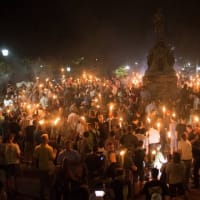
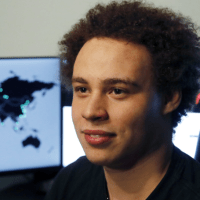
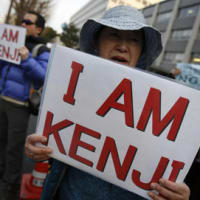
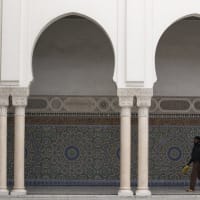
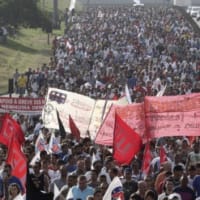


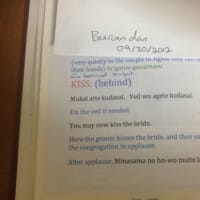
※コメント投稿者のブログIDはブログ作成者のみに通知されます